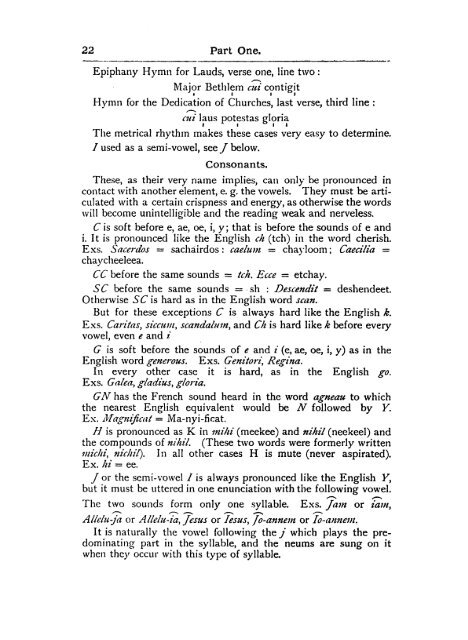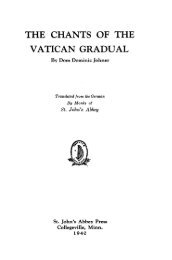Textbook of Gregorian Chant (1930) - MusicaSacra
Textbook of Gregorian Chant (1930) - MusicaSacra
Textbook of Gregorian Chant (1930) - MusicaSacra
Create successful ePaper yourself
Turn your PDF publications into a flip-book with our unique Google optimized e-Paper software.
22 Part One.<br />
Epiphany Hymn for Lauds, verse one, line two:<br />
Major Bethlem cui contigit<br />
Hymn for the Dedication <strong>of</strong> Churches, last verse, third line :<br />
cui laus potestas gloria<br />
The metrical rhythm makes these cases very easy to determine.<br />
/ used as a semi-vowel, see J below.<br />
Consonants.<br />
These, as their very name implies, can only be pronounced in<br />
contact with another element, e. g. the vowels. They must be articulated<br />
with a certain crispness and energy, as otherwise the words<br />
will become unintelligible and the reading weak and nerveless.<br />
C is s<strong>of</strong>t before e, ae, oe, i, y; that is before the sounds <strong>of</strong> e and<br />
i. It is pronounced like the English ch (tch) in the word cherish.<br />
Exs. Sacerdos = sachairdos: caelum = chayloom; Caecilia =<br />
chaycheeleea.<br />
CC before the same sounds = tch. Ecce = etchay.<br />
SC before the same sounds = sh : Descendit = deshendeet.<br />
Otherwise SC is hard as in the English word scan.<br />
But for these exceptions C is always hard like the English k.<br />
Exs. Caritas, siccum, scandalum^ and Ch is hard like k before every<br />
vowel, even e and /<br />
G is s<strong>of</strong>t before the sounds <strong>of</strong> e and i (e, ae, oe, i, y) as in the<br />
English word generous. Exs. Genitori, Regina.<br />
In every other case it is hard, as in the English go.<br />
Exs. Galea, gladius, gloria.<br />
GN has the French sound heard in the word agneau to which<br />
the nearest English equivalent would be N followed by Y.<br />
Ex. Magnificat = Ma-nyi-ficat.<br />
H is pronounced as K in mihi (meekee) and nihil (neekeel) and<br />
the compounds <strong>of</strong> nihil. (These two words were formerly written<br />
michi, nichil). In all other cases H is mute (never aspirated).<br />
Ex. hi = ee.<br />
/ or the semi-vowel / is always pronounced like the English Y9<br />
but it must be uttered in one enunciation with the following vowel.<br />
The two sounds form only one syllable. Exs. Jam or iam,<br />
Allelu-ja or Allelu-iay Jesus or fesus} Jo-annem or Io-annem.<br />
It is naturally the vowel following the/ which plays the predominating<br />
part in the syllable, and the neums are sung on it<br />
when they occur with this type <strong>of</strong> syllable.
















